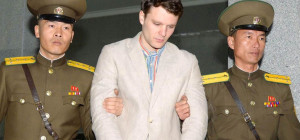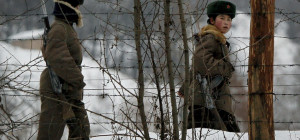 With tensions mounting after continued North Korean weapons tests, there are fears of nuclear aggression from the secretive dictatorship. Some even think that there’s a risk of war. It’s certainly a long shot, but there are a lot of ‘what ifs’ that might change the maths for the worse.
With tensions mounting after continued North Korean weapons tests, there are fears of nuclear aggression from the secretive dictatorship. Some even think that there’s a risk of war. It’s certainly a long shot, but there are a lot of ‘what ifs’ that might change the maths for the worse.
With that in mind, here are the most probable ways North Korea could win World War III.
10. Cyber Warfare
It sounds like the plot of a mid-2000s action film, probably starring Tom Cruise, but anyone who pays attention knows that Cyber Warfare is the real deal.
In May 2017, National Security Agency director Michael Rogers outlined to the US senate the nature of a worst case scenario cyber attack. In the hearing, he predicted a three-pronged approach for the worst kind of strike: there would be an “outright destructive attack… on critical infrastructure”, data manipulation on a massive scale, and ultimately the destruction of the status quo.
Such a cyber attack on the US military, whether through leaked tactical intelligence or actually knocking out key equipment, could leave it incapable of operating in an effective manner.
It’s not clear if North Korea is capable of such an attack right now, but there’s evidence of the country’s involvement in a slew of hacks, like the attack against Sony
Pictures in 2014 and the British National Health Service ransomware infiltration, which infected over 200,000 computers. In any case, crippling America’s military technology would be a massive blow in any modern war.
9. Biochemical Weapons
North Korea is a dangerously secretive nation, but we do know that it’s not above using weapons few else would even consider. In February 2017, it became apparent that the North Korean government ordered the assassination of Kim Jong Nam, brother to the current leader and former heir apparent to Kim Jong Il.
But most disturbingly, the hit was made using a chemical called VX – a nerve agent so deadly that less than a thousandth of a teaspoon is lethal. It’s banned under numerous conventions and considered a weapon of mass destruction by the UN.
Given North Korea’s history of atrocities, it’s not exactly a stretch to suggest they’d use it in an actual warfare situation.
The last time VX was known to be used was during the Halabja massacre during the Iran-Iraq war in 1988, where as many as 15,000 people were killed or injured.
If Kim Jong Un ordered its use on the battlefield, or even on US soil, the drastic death toll might place America in a no-win situation.
Given that the War on Terror has led to calls to withdraw from the Middle East after around 7,000 total US casualties, the use of such a devastating weapon might just be too much.
8. Split Resources
You probably know that the US is at war right now. In fact, it has been involved in some kind of significant conflict without interval since Afghanistan in 2001 – so possibly your entire life. But you might not know how far its military interests span. Right now, it’s involved in conflicts in Iraq, Lebanon, Nigeria, Syria, Libya, and Somalia.
On top of that, it’s conducting special operations in as many as 135 countries, though we don’t know if they’re just training or not. The point is that the US military has a lot on its plate. Of the 1.3 million troops, roughly 10% are stationed overseas in various conflicts.
And crucially, those conflicts represent a major strategic and financial drain. Since 9/11, total US war expenditure has exceeded $5 trillion dollars, heavily leaning on the weight of America’s credit card and an unwieldy national debt.
If you remember from history class, the Soviet Union’s involvement in World War II was a huge part of the eventual downfall of the Third Reich, and it’s a similar principle here.
Of course, the Soviet Union at its height was a lot more formidable than ISIS or some Somali pirates, but the idea is the same: fighting a war on two, or seven, fronts could leave the US tactically and financially vulnerable.
7. Espionage
Even now that we’re in the age of the cyber-sleuth, there’s still a lot to be said for good old-fashioned espionage. It’s certainly worth paying attention to, otherwise, the US might land itself in some seriously hot water.
There’s a long history of the Chinese supposedly spying on the US in a multitude of ways, like corporate espionage, obtaining government documents, and even the details of nuclear arsenals. As recently as 2017, a US citizen by the name of Kevin Mallory has been charged with Spying for China by leveraging his job as a defense contractor to obtain government documents in exchange for thousands of dollars.
And while America mostly has its sights on China in these cases, you could argue that such efforts are a way that North Korea could leverage an advantage in the future. DPRK spies have already been caught in a sting operation trying to steal what they thought were top secret missile plans from Ukraine.
If North Korea obtained sensitive Nuclear secrets, it could potentially advance its capabilities by decades and result in a bomb with 12 times the payload of the supposed 100 kiloton missiles tested in 2017.
6. NATO conflict
Part of what makes any future world war a losing prospect for the enemies of the US is all its allies – in particular, the 28 of them known as NATO.
The North Atlantic Treaty Organisation had the historical goal of maintaining security in Europe against the USSR, and continues in the 21st century with a very similar, if less specific bent. Either way, it’s a pretty solid line of defense.
But a European conflict could distract NATO, providing the necessary opportunity for North Korea to achieve its goals – possibly in tandem with Russia. It’s generally believed that NATO is key to maintaining stability in Europe, especially because of the mounting tension over Russia and Eastern Europe in recent years. We’ve already seen conflict between Ukraine and Russia over Crimea, prompting the former soviet state to seek NATO protection. If that conflict escalated into a full-on reheated cold war, suddenly protecting South Korea might appear less of a priority. For North Korea, that might provide an opportunity to take advantage of a distracted West. Okay, it’s not exactly world domination, but South Korea is the main goal anyway.
5. Underestimation
It’s no secret that in the Vietnam War of the 1960s, America’s underestimation and misunderstanding of the Vietcong forces, as well as the country at large, was a major factor in their eventual loss.
According to former US Lieutenant General Bernard Trainor, the US lost because the military saw the war as a crusade against communism instead of a matter of national conflict.
That’s not to mention the fact that the US was unprepared to deal with the unconventional tactics of the Vietcong guerrillas.
When it comes to North Korea, it’s worth keeping in mind that it has 13,000 artillery weapons capable of firing 500,000 rounds in just an hour, and it’s all pointed squarely at Seoul.
So if the US underestimates the North’s willingness to level the South Korean capital or the population’s loyalty, not only would it be partly responsible for hundreds of thousands of deaths but it’d also be a major strategic setback
While I’m not saying that the West is likely to bungle its World War III strategy, it’s conceivable that a misguided approach to North Korea could make things difficult, and perhaps even provide an unexpected route to victory for Kim Jong Un.
4. Military Investment
We all know North Korea likes to show off its military might with garish displays of force, like parades and the occasional missile launch. But when it comes to sheer numbers, the DPRK really can put its manpower where its mouth is.
The country has the 4th largest army on the planet, with a grand total of 1.2 million ground troops, along with a 5 million strong paramilitary force. Only China, India and the USA have more soldiers. But the North Korean military is running off massively outdated, mostly ex-soviet, equipment. Which isn’t really a match for modern American tech.
Greater investment in military technology could even the score and add some real punch to Kim Jong Un’s threats. For example, if North Korea’s latest warhead becomes reliable enough, it could kill as much as a tenth of Guam’s population with a single missile.
Willingness to use drastic weapons like modern ballistic missiles might be enough to force an early western exit from the war, just to save unnecessary deaths. But for any major improvements, particularly to ground forces, it would take a major influx of resources. Well, as it happens…
3. Untapped NK resources
After the evil dictators and cultish society, the first thing you might say about North Korea is that it’s poor. The infrastructure and military equipment is either outdated or outright crumbling. But not many people know that the country is supposedly sitting on an absolute gold mine. Well, not just gold, a veritable smorgasbord of minerals.
According to reports from South Korean mining companies and academics, the regime is sitting on deposits of iron, gold, magnesite, zinc, copper, limestone, molybdenum, and graphite; a stockpile worth between 6 and 10 trillion dollars. That’s about as much as China’s entire economic output in 2016, give or take a trillion.
North Korea is reported to spend roughly 24% of its GDP on the military, which is about 5 times Russia and 7 times the US. So, if that mineral cash made its way into their economy, there’s a good chance the DPRK government would spend a lot of it on its armed forces.
But unfortunately for the Democratic People’s Republic of Korea, it doesn’t actually have the capability to mine those minerals. It would take some major developments in the country for that to happen.
2. Lifted Sanctions
Outside of warfare, sanctions are the go-to method of responding to bad behaviour on the world stage. So it makes sense that North Korea is among the most heavily sanctioned countries in the world.
In fact, the country has been subject to international measures since the Korean War in 1950, ranging from trade embargoes and asset freezes, to bans on travel and cultural exchange. The UN sanctions put in place in 2017 are set to take as much as $1 billion in exports from the North Korea, which is approaching a tenth of its small economic output and impeding its military growth.
So you can argue that if Kim Jong Un played nice for a little while and had sanctions repealed, the door would be open to play the long game and modernise his military for future conflicts.
So if North Korea did decide to pick a fight, its chances of success would improve greatly with better weapons, infrastructure and a population that isn’t 40% malnourished.
1. Chinese Intervention
Of all the ways North Korea could win a third world war against the United States, assistance from China is probably the most plausible. And perhaps alarmingly, it’s also the most likely.
According to the influential Chinese Newspaper The Global Times, China wouldn’t defend North Korea if it acted as the aggressor by launching a strike on Guam, South Korea or even America.
But crucially, if the US acted first, China would support its neighbour from any preventative or aggressive measures. That’s because, like Russia, it doesn’t want a unified western ally on its doorstep. In other words, an unstable ally is better than a predictable enemy. As for what would happen in that conflict – jury’s out.
China has a less technologically developed military, but 50% more manpower than the US army. Plus China’s president Xi Jinping has even made a concerted effort to modernise his forces in line with the west.
Luckily for the world, it’s unlikely that the war would go nuclear, since that would pretty much ensure global annihilation.
The US and China combined have over 7,000 nuclear weapons, and the likely involvement of their allies could see all 15,000 of the world’s nukes being fired. Instead, the Rand corporation military think-tank predicts that the conflict would be primarily air and sea based, which would be incredibly costly.
It’s hard to predict how North Korea would fare in this military exchange, but it’s undoubtedly the best chance Kim Jong Un has.
Which one of these ways do you think is most likely to happen?
Let us know in the comments.




